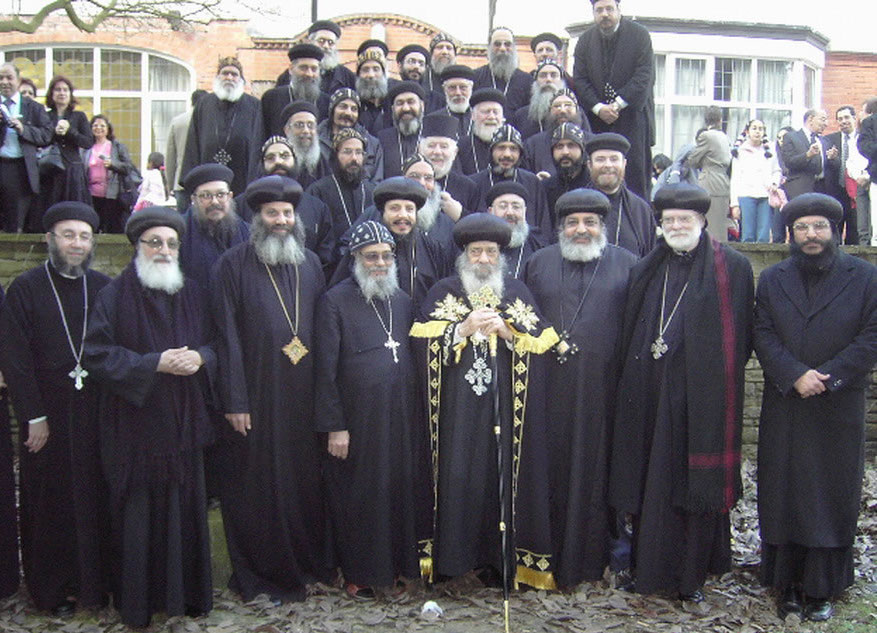
Levels in the Spiritual Life

Lecture given by His Holiness during his pastoral visit to Birmingham in 2006.
In the Book of the Levels of Virtues by St. John Climacus, there are 30 steps of which most are maybe about the monastic life…
As for the spiritual life in general, there are a least three main steps and they are: Life of Repentance, Life of Holiness, and Life of Perfection. And each of these steps has many details and branches…
As for the Repentance, because he beginning of the Lord Christ’s preaching was his saying: “the kingdom of God is at hand. Repent, and believe in the gospel” (Mk 1:15). He also said: “unless you repent you will all likewise perish” (Lk 13:3, 5).
And about Holiness, the apostle says: “but as He who called you is holy, you also be holy in all your conduct, because it is written, “Be holy, for I am holy” (1 P 1:15, 16) (Lv 11:44).
And about Perfection, the Lord says in His sermon on the mountain “Therefore you shall be perfect, just as your Father in heaven is perfect.” (Mt 5:48).
The Life of Repentance:
If the sin is a separation from God and a controversy with Him, then repentance is the beginning of reconciliation with God. As the apostle says: “be reconciled to God” (2 Co 5:20). Repentance, then is the beginning of a new pure relationship with God. It is a transfer from darkness to light, and a return from the far country to the Father’s bosom.
And repentance is preceded or is prepared for through: Knowledge and God’s fear:
One’s knowledge that He is the God’s son, and created on the image and according to the likeness of God, so it is inappropriate for him to sin, his knowledge that he is a temple for God’s Spirit, and God’s Spirit dwells in him (1 Co 3:16). It is inappropriate for him, with his sin, to grieve the Holy Spirit of God (Eph 4:30),… And his knowledge also that through sin, he makes God angry with him, and he puts himself to God’s anger and punishment on Earth and in Heaven…
Therefore, from all his heart he fears the Lord’s saying: “unless you repent you will all likewise perish” (Lk 13:3, 5).
And all this admits God’s fear in his heart so he does not sin.
And the bible talked about God’s fear and it was said that “The fear of the LORD is the beginning of wisdom” (Ps 111:10). And “The fear of the LORD is the beginning of wisdom” (Pr 9:10). And it is obvious that the man, while committing the sin, does not have God’s fear in his heart or before his eyes.
And no one should say “We have to love God, not to fear Him”. As the apostle says “There is no fear in love; but perfect love casts out fear” (1 Jn 4:18)… so whom of us reached the perfect love level?! The Lord says: “he who loves Me, keeps my commandments” and “If you keep My commandments, you will abide in My love” (Jn 15:10).
So we walk in the fear, and the fear at the end will take us to God’s love.
He who loves God does not sin. And if he stays away from sin, he reaches God’s love. Or God pours love in his heart through the Holy Spirit.
And repentance should be comprehensive, covering all sin types with all their details: I mean the body sins, the senses sins, the thought sins and the mind and intentions sins.
And repentance is not only refraining from sin in action.
Maybe the person stops doing this sin, but it still exists in a heart desire, so he sins in his heart, and did not repent yet… Or the sin may be existing in his intention without him doing it! Or in his dreams because his subconscious is not purified yet! And St. Jerome said “There may be people who have chastity in their bodies while their souls are committing adultery!!”. Therefore, the fathers said:
“The perfection of repentance is the hatred of sin”.
And he who hates the sin, the sin desire is not in his heart, in his intention, in his thinking nor in his subconscious, but he is totally purified, and so he does not sin…
And we say that about all sin types… and so he has moved from the negatives attached with sins to the positive sides of repentance.
And he who repents does not go back to the sin because he who does maybe is in a mere trial to repent and not in a full comprehensive repentance.
Therefore, the true repentants, like St. Moses the Black, St. Augustine and Mary the Coptic… transferred by growing in repentance to the life of holiness.
The repentance in their life is a full transformation point, and a full change from a life to another, without regretting and without return… but with all their hearts they worked on fixing what was resulted by their sins like what Zakka the chief tax collector did and said: “and if I have taken anything from anyone by false accusation, I restore fourfold” (Lk 19:8).
And the signs of repentance of humility and contrition appear in the repentant’s life:
Like Prophet David who drench his couch with my tears (Ps 6). And contrition appeared in so many of his psalms… And like St. Augustine who published his confessions in a book that was read by generations in which he mentioned what he imagines about (the sins) of his early childhood… And like the lost son who, in his repentance, said to his father: “and am no longer worthy to be called your son” (Lk 15:21).
The Life of Purity and Holiness:
It is a higher level than repentance because it is the positive side of the life of virtue.
And in it the statement “who do not walk according to the flesh, but according to the Spirit” (Ro 8:1) is applicable on believers, according to their pure spirits and the work of the Holy Spirit on them.
And from here the man is called spiritual, and appears in his life the fruits of the Holy Spirit.
And St. Paul the apostle said: “But the fruit of the Spirit is love, joy, peace, longsuffering, kindness, goodness, faithfulness, gentleness, self-control” (Ga 5:22, 23). And who of us, my brothers, mastered all these virtues and made them a system for his life?
One of them which is (love), the apostle explained its details in (1 Co 13) and said:
“Love suffers long and is kind; love does not envy; love does not parade itself, is not puffed up; does not behave rudely, does not seek its own, is not provoked, thinks no evil; does not rejoice in iniquity…” until his said “Love never fails.” (1 Co 13:4-8). So, whom among us has all these characteristics?!
And out of the importance of love, the Lord’s said about it that the all the Law and the prophets hang on love, and it had two parts: “You shall love the LORD your God with all your heart… You shall love your neighbor as yourself” (Mt 22:37-40).
This is the love that never fails, whom of us has reached this level? And whom of us “loves his neighbor as himself”? Or who applies the statement “love does not seek its own”? And who applies the statement “Greater love has no one than this, than to lay down one’s life for his friends” (Jn 15:13). Here is the level of holiness that the lord says about: “Be holy, for I am holy”.
So, if one did not reach the level of love that puts itself for others, so at least one should try to reach the level of love that serves others, and I mean spiritual service…
Someone said about the relation between the servant and the served ones:
“When I love them, O Lord, like You love the, and when I love them like You loved me and out Yourself for me, at that time, I am entrusted on their service”.
Yes my brothers, the service of others, in any mean, is necessary in the life of virtue, and an evidence of loving our neighbor, which is a branch of the full love that the all the Law and the prophets hang on, and the biggest factor of this love is leading others to the Kingdom, and working on saving their souls…
It was said about the great virtues: “faith, hope and love but the greatest of these is love” (1 Co 13:13). So what about the virtue of hope in your life? And what about faith?
I do not mean by faith our repeating the Orthodox Creed. But I mean your practical faith: Your belief that God sees all what you do, hears all what you say, and knows all what you feel and think of. Also the faith in which you believe in God’s keeping you, because the believer does not get afraid, but says as in the psalm: “though I walk through the valley of the shadow of death, I will fear no evil; For You are with me;” (Ps 23).
The Life of Perfection:
The one who grows in the life of holiness, reaches the life of perfection:
And we mean relative perfection: relative to the human abilities and his level, and relative to the grace God grants him.
As for the absolute perfection, it is for God alone.
And the person grows in perfection, and moves up from one level to another, because “for one star differs from another star in glory” (1 Co 15:41). And in it God grants the gifts of the Holy Spirit as they came in (1 Co 12)… And continues and completes in eternity.








